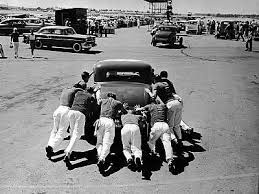The cash for clunkers is a clear example of the economic fallacy known as Bastiat’s fallacy. We see the results of the expenditure- a sharply increase in auto sales- but we ignore the real cost of the program because we do not see it. That $4500 spent on turning in your clunker was $4500 not spent on something else like … let’s say… health insurance, education, debt reduction, solar panels, wind mills, home improvements… you get the point. There is no net economic gain. Spending does not create wealth, yet our economic policy contends that it does.
These clunkers would have been removed from the national fleet eventually; we only speeded up the process a few years. So even the environmental impact is minimal.
It is also interesting that of the top five cars benefitting from the program there is not one Chrysler or GM product in there. Ford was one of them, Toyota had three models and Honda had one. Originally the foreign owned cars were excluded, but this was changed.
Auto buyers have long learned to forestall purchases to take advantage of promotions and discounts. This flurry of activity will likely come at the expense of next year’s sales.


Recent Comments